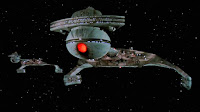Once again, I'm looking back at previous installments of some of this summer's returning franchises.
Technically, the upcoming Star Trek Beyond is only the third movie in the series that began with 2009's Star Trek, but I wanted to go back to the beginning of Trek movies anyway, to get a broader sense of the history and also to watch a few movies that I've never seen before. The 1979 series opener Star Trek: The Motion Picture is one of those; as a relatively casual Trek fan, I've more closely followed the later TV series than the original, and the same goes for the movies. I can't say I'd really recommend The Motion Picture to anyone but dedicated Trek fans, since it's more of an interesting transitional piece than a good movie. It feels like a really, really padded episode of the TV show (at 132 minutes, it's tied with Star Trek Into Darkness as the longest movie in the franchise to date), and for good reason: Originally it was set to be the two-part pilot episode of a new Trek series, titled Phase II, before Paramount executives changed course and decided to make a feature film instead of launching a new TV show.
The Motion Picture's production values are suitably cinematic, and they're really the only reason to watch the movie for anyone who's not a serious Trekkie. Much of the movie's agonizingly slow pace could be attributed to the amazingness of the special effects, actually, as director Robert Wise seems so awed by the effects that he regularly stops the movie cold just to admire them. There is a sequence early in the movie that seems to go on for a good 10 minutes, in which all that happens is that Kirk (William Shatner) and Scotty (James Doohan) take a shuttle pod from a space station to the newly spruced-up Enterprise. There's barely even any dialogue as they literally just stand and stare at the ship. This movie might set a record for shots of characters looking at something in awe.
The miniatures, matte paintings and photographic effects (many by the legendary Douglas Trumbull) are indeed astonishing, though, and they hold up remarkably well with only a handful of exceptions. They were justifiably nominated for an Oscar (respectably losing to Alien), and they mostly kept my interest even when the plot was moving at a snail's pace. It takes half an hour just to get the crew from the original series back aboard the Enterprise, along with new characters Commander Decker (future 7th Heaven star Stephen Collins) and Lt. Ilia (Indian actress Persis Khambatta), both of whom were originally set to be series regulars on the aborted Phase II series.
Instead, they're co-opted by the slow-moving drama of a giant alien entity headed toward Earth and consuming nearly everything in its wake. The Enterprise sets out to communicate with and hopefully stop this entity, and the eventual reveal of its true nature is the kind of hokey but intriguing philosophical conundrum that would be right at home in an episode of the original series. That's both reassuring and disappointing, since the movie should probably provide a more epic, exciting climax. Instead, it provides lots of long, lingering shots of cool space stuff, which aim for a 2001 feel but lack Stanley Kubrick's sense of the mysterious and unknowable. The space of Star Trek is entirely knowable, which is one of the series' greatest strengths, but The Motion Picture ends up missing that particular strength entirely.




No comments:
Post a Comment